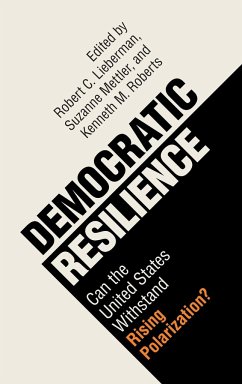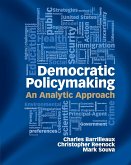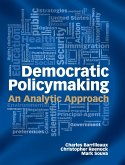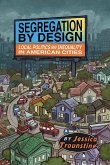Democratic Resilience
Herausgeber: Lieberman, Robert C.; Roberts, Kenneth M.; Mettler, Suzanne
Democratic Resilience
Herausgeber: Lieberman, Robert C.; Roberts, Kenneth M.; Mettler, Suzanne
- Gebundenes Buch
- Merkliste
- Auf die Merkliste
- Bewerten Bewerten
- Teilen
- Produkt teilen
- Produkterinnerung
- Produkterinnerung
Social and political polarization has posed novel challenges to U.S. democracy in recent years. Democratic Resilience examines the effects of polarization on democratic institutions and political behavior, exploring the sources of democratic resilience that can stabilize and protect the democratic order in the years ahead.
Andere Kunden interessierten sich auch für
![Democratic Policymaking Democratic Policymaking]() Charles BarrilleauxDemocratic Policymaking74,99 €
Charles BarrilleauxDemocratic Policymaking74,99 €![Democratic Policymaking Democratic Policymaking]() Charles BarrilleauxDemocratic Policymaking101,99 €
Charles BarrilleauxDemocratic Policymaking101,99 €![The Paradox of Traditional Chiefs in Democratic Africa The Paradox of Traditional Chiefs in Democratic Africa]() Kate BaldwinThe Paradox of Traditional Chiefs in Democratic Africa106,99 €
Kate BaldwinThe Paradox of Traditional Chiefs in Democratic Africa106,99 €![Civil Society and Memory in Postwar Germany Civil Society and Memory in Postwar Germany]() Jenny WüstenbergCivil Society and Memory in Postwar Germany47,99 €
Jenny WüstenbergCivil Society and Memory in Postwar Germany47,99 €![Hacking the Electorate Hacking the Electorate]() Eitan D. HershHacking the Electorate34,99 €
Eitan D. HershHacking the Electorate34,99 €![Institutions and Democracy in Africa Institutions and Democracy in Africa]() Institutions and Democracy in Africa40,99 €
Institutions and Democracy in Africa40,99 €![Segregation by Design Segregation by Design]() Jessica TrounstineSegregation by Design30,99 €
Jessica TrounstineSegregation by Design30,99 €-
-
-
Social and political polarization has posed novel challenges to U.S. democracy in recent years. Democratic Resilience examines the effects of polarization on democratic institutions and political behavior, exploring the sources of democratic resilience that can stabilize and protect the democratic order in the years ahead.
Produktdetails
- Produktdetails
- Verlag: Cambridge University Press
- Seitenzahl: 428
- Erscheinungstermin: 23. Oktober 2021
- Englisch
- Abmessung: 235mm x 157mm x 30mm
- Gewicht: 842g
- ISBN-13: 9781108834100
- ISBN-10: 1108834108
- Artikelnr.: 62290212
- Herstellerkennzeichnung
- Libri GmbH
- Europaallee 1
- 36244 Bad Hersfeld
- gpsr@libri.de
- Verlag: Cambridge University Press
- Seitenzahl: 428
- Erscheinungstermin: 23. Oktober 2021
- Englisch
- Abmessung: 235mm x 157mm x 30mm
- Gewicht: 842g
- ISBN-13: 9781108834100
- ISBN-10: 1108834108
- Artikelnr.: 62290212
- Herstellerkennzeichnung
- Libri GmbH
- Europaallee 1
- 36244 Bad Hersfeld
- gpsr@libri.de
Part I. Why Might Polarization Harm Democracy? Theory and Comparison; 1.
How Democracies Endure: The Challenges of Polarization and Resilience
Robert C. Lieberman, Suzanne Mettler, and Kenneth M. Roberts; 2.
Polarization and the Durability of Madisonian Checks and Balances: A
Developmental Analysis Paul Pierson and Eric Schickler; 3. Pernicious
Polarization and Democratic Resilience: Analyzing the United States in
Comparative Perspective Jennifer McCoy and Murat Somer; Part II. Political
Institutions in Polarized Times; 4. Cross-Cutting Cleavages, Political
Institutions, and Democratic Resilience in the US Frances E. Lee; 5.
Unilateralism Unleashed? Polarization and the Politics of Executive Action
Douglas L. Kriner; 6. Court-Packing and Democratic Erosion Thomas M. Keck;
Part III. Social Polarization and Partisanship; 7. The Social Roots, Risks,
and Rewards of Mass Polarization Lilliana Mason and Nathan P. Kalmoe; 8.
The Great White Hope: Threat and Racial Resilience in the Age of Trump
Christopher Sebastian Parker and Matt A. Barreto; 9. The Religious Sort:
The Causes and Consequences of the Religiosity Gap in America Michele F.
Margolis; 10. Weaponized Group Identities and the Health of Democracy: Why
the National Rifle Association is Good at Democracy but Bad for It Matthew
J. Lacombe; Part IV. Vicious Circles? The Relationship Between Polarized
Behavior and Institutions; 11. Polarization, the Administrative State, and
Executive-Centered Partisanship Desmond King and Sidney Milkis; 12.
Laboratories of What? American Federalism and the Politics of Democratic
Subversion Philip Rocco; 13. Conservative Extra-Party Coalitions and
Statehouse Democracy Alexander Hertel-Fernandez; Part V. Can Political
Action Save Democracy in Polarized Times? 14. Elections, Polarization, and
Democratic Resilience David A. Bateman; 15. Citizen Mobilization and
Partisan Polarizations from the Tea Party to the Anti-Trump Resistance
Theda Skocpol, Caroline Tervo, and Kirsten Walters.
How Democracies Endure: The Challenges of Polarization and Resilience
Robert C. Lieberman, Suzanne Mettler, and Kenneth M. Roberts; 2.
Polarization and the Durability of Madisonian Checks and Balances: A
Developmental Analysis Paul Pierson and Eric Schickler; 3. Pernicious
Polarization and Democratic Resilience: Analyzing the United States in
Comparative Perspective Jennifer McCoy and Murat Somer; Part II. Political
Institutions in Polarized Times; 4. Cross-Cutting Cleavages, Political
Institutions, and Democratic Resilience in the US Frances E. Lee; 5.
Unilateralism Unleashed? Polarization and the Politics of Executive Action
Douglas L. Kriner; 6. Court-Packing and Democratic Erosion Thomas M. Keck;
Part III. Social Polarization and Partisanship; 7. The Social Roots, Risks,
and Rewards of Mass Polarization Lilliana Mason and Nathan P. Kalmoe; 8.
The Great White Hope: Threat and Racial Resilience in the Age of Trump
Christopher Sebastian Parker and Matt A. Barreto; 9. The Religious Sort:
The Causes and Consequences of the Religiosity Gap in America Michele F.
Margolis; 10. Weaponized Group Identities and the Health of Democracy: Why
the National Rifle Association is Good at Democracy but Bad for It Matthew
J. Lacombe; Part IV. Vicious Circles? The Relationship Between Polarized
Behavior and Institutions; 11. Polarization, the Administrative State, and
Executive-Centered Partisanship Desmond King and Sidney Milkis; 12.
Laboratories of What? American Federalism and the Politics of Democratic
Subversion Philip Rocco; 13. Conservative Extra-Party Coalitions and
Statehouse Democracy Alexander Hertel-Fernandez; Part V. Can Political
Action Save Democracy in Polarized Times? 14. Elections, Polarization, and
Democratic Resilience David A. Bateman; 15. Citizen Mobilization and
Partisan Polarizations from the Tea Party to the Anti-Trump Resistance
Theda Skocpol, Caroline Tervo, and Kirsten Walters.
Part I. Why Might Polarization Harm Democracy? Theory and Comparison; 1.
How Democracies Endure: The Challenges of Polarization and Resilience
Robert C. Lieberman, Suzanne Mettler, and Kenneth M. Roberts; 2.
Polarization and the Durability of Madisonian Checks and Balances: A
Developmental Analysis Paul Pierson and Eric Schickler; 3. Pernicious
Polarization and Democratic Resilience: Analyzing the United States in
Comparative Perspective Jennifer McCoy and Murat Somer; Part II. Political
Institutions in Polarized Times; 4. Cross-Cutting Cleavages, Political
Institutions, and Democratic Resilience in the US Frances E. Lee; 5.
Unilateralism Unleashed? Polarization and the Politics of Executive Action
Douglas L. Kriner; 6. Court-Packing and Democratic Erosion Thomas M. Keck;
Part III. Social Polarization and Partisanship; 7. The Social Roots, Risks,
and Rewards of Mass Polarization Lilliana Mason and Nathan P. Kalmoe; 8.
The Great White Hope: Threat and Racial Resilience in the Age of Trump
Christopher Sebastian Parker and Matt A. Barreto; 9. The Religious Sort:
The Causes and Consequences of the Religiosity Gap in America Michele F.
Margolis; 10. Weaponized Group Identities and the Health of Democracy: Why
the National Rifle Association is Good at Democracy but Bad for It Matthew
J. Lacombe; Part IV. Vicious Circles? The Relationship Between Polarized
Behavior and Institutions; 11. Polarization, the Administrative State, and
Executive-Centered Partisanship Desmond King and Sidney Milkis; 12.
Laboratories of What? American Federalism and the Politics of Democratic
Subversion Philip Rocco; 13. Conservative Extra-Party Coalitions and
Statehouse Democracy Alexander Hertel-Fernandez; Part V. Can Political
Action Save Democracy in Polarized Times? 14. Elections, Polarization, and
Democratic Resilience David A. Bateman; 15. Citizen Mobilization and
Partisan Polarizations from the Tea Party to the Anti-Trump Resistance
Theda Skocpol, Caroline Tervo, and Kirsten Walters.
How Democracies Endure: The Challenges of Polarization and Resilience
Robert C. Lieberman, Suzanne Mettler, and Kenneth M. Roberts; 2.
Polarization and the Durability of Madisonian Checks and Balances: A
Developmental Analysis Paul Pierson and Eric Schickler; 3. Pernicious
Polarization and Democratic Resilience: Analyzing the United States in
Comparative Perspective Jennifer McCoy and Murat Somer; Part II. Political
Institutions in Polarized Times; 4. Cross-Cutting Cleavages, Political
Institutions, and Democratic Resilience in the US Frances E. Lee; 5.
Unilateralism Unleashed? Polarization and the Politics of Executive Action
Douglas L. Kriner; 6. Court-Packing and Democratic Erosion Thomas M. Keck;
Part III. Social Polarization and Partisanship; 7. The Social Roots, Risks,
and Rewards of Mass Polarization Lilliana Mason and Nathan P. Kalmoe; 8.
The Great White Hope: Threat and Racial Resilience in the Age of Trump
Christopher Sebastian Parker and Matt A. Barreto; 9. The Religious Sort:
The Causes and Consequences of the Religiosity Gap in America Michele F.
Margolis; 10. Weaponized Group Identities and the Health of Democracy: Why
the National Rifle Association is Good at Democracy but Bad for It Matthew
J. Lacombe; Part IV. Vicious Circles? The Relationship Between Polarized
Behavior and Institutions; 11. Polarization, the Administrative State, and
Executive-Centered Partisanship Desmond King and Sidney Milkis; 12.
Laboratories of What? American Federalism and the Politics of Democratic
Subversion Philip Rocco; 13. Conservative Extra-Party Coalitions and
Statehouse Democracy Alexander Hertel-Fernandez; Part V. Can Political
Action Save Democracy in Polarized Times? 14. Elections, Polarization, and
Democratic Resilience David A. Bateman; 15. Citizen Mobilization and
Partisan Polarizations from the Tea Party to the Anti-Trump Resistance
Theda Skocpol, Caroline Tervo, and Kirsten Walters.









